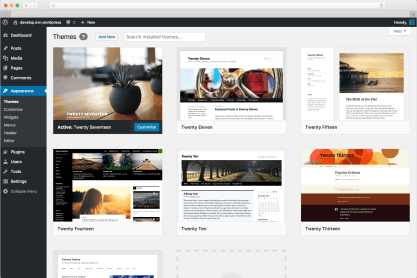What is a CMS? Which CMS should you choose?
Today, there are many ways to create a professional website – from using popular programs to building a website in a cloud service. And the technologies in this area are developing at such a high speed that it is already difficult to imagine what will happen next. However, one thing in web design remains constant – CMS. What is a CMS?
CMS (content management system) is a software that allows you to create and modify digital content. Basically, by answering a simple question “What is a CMS?”, we mean the system that creates a website.
What does this mean in practice? In simple words, CMS is a popular program that allows you to build and develop a website.
The list of top 10 CMS in the world:
There are 2 important points to note here:
- Some CMS from the list – for example, Wix and Squarespace – are cloud services, with a monthly subscription.
- The Bitrix platform, better known as 1C-Bitrix, is a fairly popular CMS in the CIS countries. In most cases, Russian companies, when they decide to create a website, think about either WordPress or Bitrix. However, in the international segment, this platform has not yet won a large market share, usually people don’t consider it to be in top 10 cms list.
So, how to work with CMS? Which one from top 10 cms to choose?
If we look at every available CMS, the article will be unreasonably voluminous, so let’s take the most popular CMS on the market as an example – WordPress
WordPress Interface:

If we consider the basic version of WordPress, the development of a website begins with the selection of a theme – the main component responsible for the structure of a website. Then on this topic you can build a blog or a multi-page website – for example, a portfolio or a website about a company.
Seems too trite? Don’t despair, WordPress is the most flexible of CMS, and in order to satisfy our web needs, we need plugins. Read more about basic plugins here. And now briefly about the main types of plugins:
-
Page Builders
These are plugins that allow you to create a professional website in the form of drag-and-drop using pre-prepared templates. The most popular similar plugin is Elementor.

-
Online store
Plugins allowing you to create an online store. The most popular is WooCommerce.

-
SEO WordPress
WordPress provides great opportunities for website promotion – the main thing is to choose the right plugin. For these purposes, you can use one of two: Yoast SEO or Rank Math.

WordPress positions itself as an open source CMS, and this is its main advantage. Enthusiasts around the world have created such a huge number of different plugins and add-ons for it that it is quite possible to solve any web design problem with their help.
In today’s world, when people usually ask a question “What is a CMS?”, sometimes they can get a simple answer “it’s WordPress”. So, if you a newbie in Web design, WordPress is a good start.
However, very often quite fair option would be to choose a different CMS. What should be done in this case?
We can recommend two options: Bitrix or cloud site builders.
1C-Bitrix
This platform of Russian development is very well established in the CIS, easily cracking to the top of top 10 CMS list. What is the reason for its popularity? First of all – it is convenient and has excellent functionality. What are the disadvantages? It is very expensive.
This CMS can be described as follows: beautiful, high-quality, expensive. For our part, we can not recommend this platform to a novice web designer – after all, it is intended for more global projects. This is a very specific CMS that is not as flexible as WordPress. A more detailed article on this subject can be found here.
Cloud website builders
Cloud website builders are not new to the Internet, but they have proven themselves well. What are the advantages of cloud website builders:
- The lack of most technical problems.
- Excellent site loading speed.
- A large number of templates.
- Intuitive interface.
What are the disadvantages? There are only two of them: monthly payment, and less creativity than WordPress. Of course, ease of use is likely to be a plus for most, but you should remember about the uniqueness of a website. For example, using the Elementor plugin for WordPress one can achieve great results. As for the rest, everyone is unanimous: cloud website builders are quite expensive.
Here is the list of some of the best cloud website builders:








